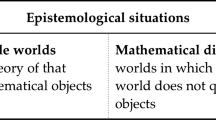Abstract
In this paper I examine Quine's indispensability argument, with particular emphasis on what is meant by 'indispensable'. I show that confirmation theory plays a crucial role in answering this question and that once indispensability is understood in this light, Quine's argument is seen to be a serious stumbling block for any scientific realist wishing to maintain an anti-realist position with regard to mathematical entities.
Similar content being viewed by others
REFERENCES
Baker, A. 'Mathematics Indispensability and Scientific Progress', to appear.
Bernstein, J. (1973): Einstein, Glasgow: Fontana/Collins.
Benacerraf, P. (1983): 'What Numbers Could Not Be', in P. Benacerraf and H. Putnam (eds.), Philosophy of Mathematics Selected Readings, second edition, Cambridge: Cambridge University Press, pp. 272–294.
Benacerraf. P. (1983): 'Mathematical Truth', in P. Benacerraf and H. Putnam (eds.), Philosophy of Mathematics Selected Readings, second edition, Cambridge: Cambridge University Press, pp. 403–420.
Boyce, W.E. and DiPrima, R.C. (1986): Elementary Differential Equations and Boundary Value Problems, 4th Edition, New York: John Wiley.
Burgess, J. (January 1983): 'Why I Am Not a Nominalist', Notre Dame Journal of Formal Logic 24(1), 93–105.
Colyvan, M. 'In Defence of Indispensability', forthcoming in Philosophia Mathematica.
Dyson, F.J. (Sept 1964): 'Mathematics in the Physical Sciences', Scientific American 211(3), 128–146.
Einstein, A. (1923): 'On the Electrodynamics of Moving Bodies', reprinted in A. Einstein, H.A. Lorentz, H. Weyl and H. Minkowski (eds.), The Principle of Relativity, New York: Dover, 35–65.
Field, H. (1980): Science Without Numbers, Oxford: Blackwell.
Field, H. (1989): Realism, Mathematics and Modality, Oxford: Blackwell.
Geach, P. and Black, M. (eds.) (1970): Translations from the Philosophical Writings of Gottlob Frege, Cambridge: Blackwell.
Glymour, C. (1980): theory and Evidence, Princeton, New Jersey: Princeton University Press.
Hempel, C.G. (1965): Aspects of Scientific Explanation and Other Essays in the Philosophy of Science, London: Macmillan.
Horwich, P. (1982): Probability and Evidence, Cambridge: Cambridge University Press.
Kitcher, P. (1981): 'Explanatory Unification', Philosophy of Science 48, 507–531.
Lorentz, H.A. (1923): 'Michelson's Interference Experiment', reprinted in A. Einstein, H.A. Lorentz, H. Weyl and H. Minkowski (eds.), The Principle of Relativity, New York: Dover, pp. 1–7.
Lorentz, H.A. (1923): 'Electromagnetic Phenomena in a System Moving with Any Velocity Less Than That of Light', reprinted in A. Einstein, H.A. Lorentz, H. Weyl and H. Minkowski (eds.), The Principle of Relativity, New York: Dover, pp. 9–34.
Maddy, P. (June 1992): 'Indispensability and Practice', Journal of Philosophy 89(6), 275–289.
Maddy, P. (September 1995): 'Naturalism and Ontology', Philosophia Mathematica 3(3), 248–270.
Papineau, D. (1993): Philosophical Naturalism, Oxford: Blackwell.
Putnam, H. (1971): Philosophy of Logic, New York: Harper and Row.
Quine, W.V. (1953): 'On What There Is', From a Logical Point of View, Cambridge, Massachusetts: Harvard University Press, pp. 1–19.
Quine, W.V. (1953): 'Two Dogmas of Empiricism', From a Logical Point of View, Cambridge, Massachusetts: Harvard University Press, pp. 20–46.
Quine, W.V. (1976): 'Posits and Reality', The Ways of Paradox and Other Essays, revised edition, Cambridge, Massachusetts: Harvard University Press, 246–254.
Quine, W.V. (1981): 'Five Milestones of Empiricism', Theories and Things, Cambridge, Massachusetts: Harvard University Press, 67–72.
Quine, W.V. (1981): Success and limits of mathematization, Theories and Things, Cambridge, Massachusetts, Harvard University Press, 148–155.
Steiner, M. (September 1989): 'The Application of Mathematics to Natural Science', The Journal of Philosophy 86(9), 449–480.
van Fraassen, B. (1980): The Scientific Image, Oxford: Clarendon.
Weinberg, S. (1993): Dreams of a Final Theory, London: Vintage.
Wigner, E.P. (Feb 1960): 'The Unreasonable Effectiveness of Mathematics in the Natural Sciences', Communications on Pure and Applied Mathematics 13, 1–14.
Author information
Authors and Affiliations
Rights and permissions
About this article
Cite this article
Colyvan, M. Confirmation Theory and Indispensability. Philosophical Studies 96, 1–19 (1999). https://doi.org/10.1023/A:1004248218844
Issue Date:
DOI: https://doi.org/10.1023/A:1004248218844



